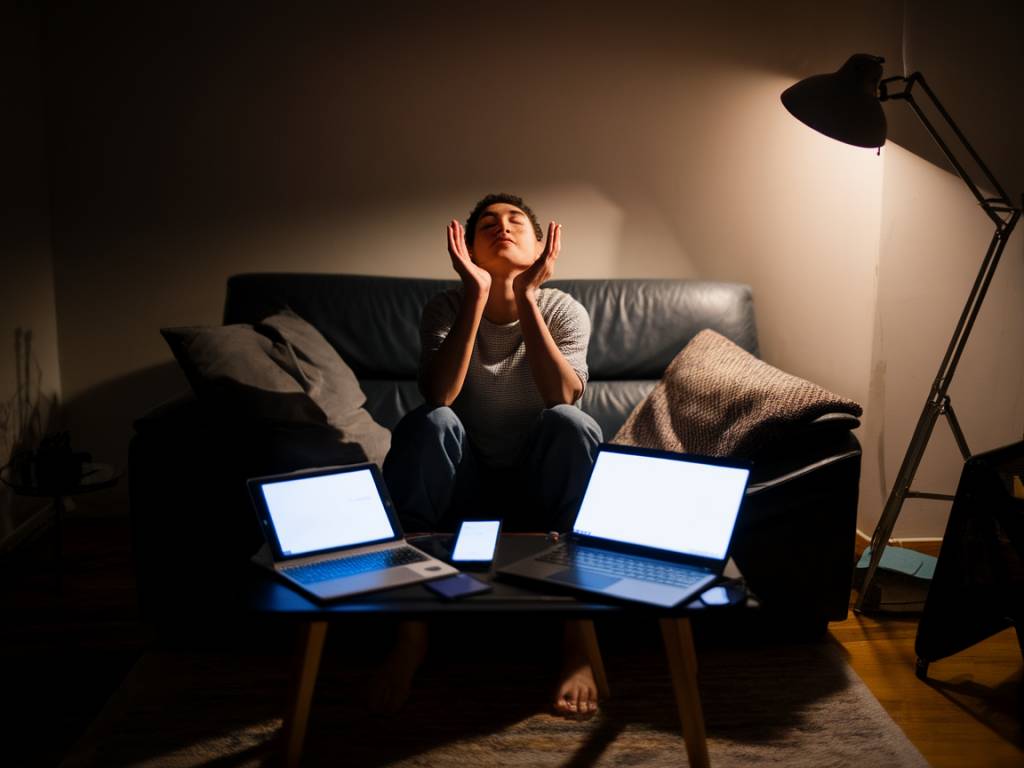The impact of excessive screen time on mental health

The impact of excessive screen time on mental health
In today’s digital age, screens are an inseparable part of our lives. From work and education to entertainment and social connections, screen usage has become unavoidable. But what happens when your screen time goes into overdrive? The answer lies in its potential impact on one of the most delicate aspects of our well-being: mental health.
The Rise of Excessive Screen Time
Take a moment to think about your daily routine. How many hours do you spend in front of a screen? The truth is, for many, it’s difficult to even keep track. Studies reveal that the average adult spends about 7 hours a day staring at devices, while teens often exceed that number. Between binge-watching shows, scrolling through social media, and attending endless Zoom calls, it’s no wonder screen time has shot through the roof.
But why is this concerning? While technology offers incredible benefits, too much screen exposure can lead to some unintended consequences for our mental health. Let’s explore what these are and how they might be affecting you more than you realize.
The Link Between Screen Time and Mental Health
Prolonged screen time can have a direct impact on mental health outcomes. Here’s what research and psychologists are saying:
- Increased Stress and Anxiety: Ever feel anxious after getting lost down a social media rabbit hole? Studies show that excessive screen exposure, especially on platforms where we compare ourselves to others, can heighten anxiety and stress levels.
- Poor Sleep Quality: Late-night scrolling or watching Netflix in bed might feel like a relaxing routine, but screens emit blue light that interferes with your sleep cycle. This disruption often leads to fatigue, mood swings, and difficulty concentrating the next day.
- Heightened Feelings of Isolation: Ironically, being connected 24/7 can sometimes make you feel more alone. While social media allows us to stay in touch, it can also foster feelings of loneliness when we’re not engaging meaningfully with others.
- Increased Risk of Depression: A growing body of evidence links extensive screen time with symptoms of depression. Whether it’s the addictiveness of gaming or the emotional impact of cyberbullying, screens can play a role in deepening depressive thoughts.
The Domino Effect of Physical Health on Mental Well-being
It’s not just mental health that takes a hit—physical health and mental health are two sides of the same coin. Consider the physical consequences of screen overuse:
- Eye Strain: Staring at a screen for long hours can lead to digital eye strain. This not only causes discomfort but can also trigger headaches and irritability, affecting your emotional state.
- Decreased Physical Activity: The hours spent sitting with a device often replace time that could be spent exercising. Lack of physical activity is directly linked to higher levels of stress and lower overall mood.
- Bad Posture: Who else is guilty of slouching while scrolling? Poor posture leads to neck and back pain, which, over time, can impact your mental resilience.
If the connection between screen usage and physical health feels indirect, consider how pain or lack of energy can compound existing mental health challenges. When your body feels off, your mind is bound to follow.
The Social Media Paradox
Social media is often a double-edged sword. On one hand, it allows us to celebrate achievements, stay up to date with loved ones, and join communities. On the other, it promotes comparison, misinformation, and unrealistic portrayals of life. Who hasn’t looked at someone’s perfectly curated Instagram feed and wondered, “Why isn’t my life this perfect?”
These comparisons can lead to a negative self-image and erode self-esteem over time. It becomes a vicious cycle: we feel bad, we doom-scroll as a coping mechanism, and then feel even worse. If that sounds familiar, you’re not alone—research shows that this pattern is increasingly common, especially among young adults.
How to Strike a Healthy Balance
Does this mean we should ditch all screens and move to the middle of nowhere? Of course not! The key is moderation. Here are some actionable steps to help reduce excessive screen time and foster better mental health:
- Set Limits: Utilize built-in screen time tracking apps or digital well-being tools to monitor and restrict your daily usage. A simple 30-minute cut can have significant benefits.
- Take Frequent Breaks: Follow the 20-20-20 rule: every 20 minutes, look at something 20 feet away for at least 20 seconds. It sounds simple but can work wonders for reducing eye strain and mental fatigue.
- Unplug Before Bedtime: Create a habit of disconnecting from screens at least an hour before sleep. Instead, pick up a book, stretch, or journal to wind down.
- Create Screen-Free Zones: Designate areas in your home, like the bedroom or dining table, as screen-free spaces to encourage presence and relaxation.
- Be Selective About Content: Follow accounts and consume media that uplift, educate, or inspire you. Unfollow anything that leaves you feeling drained or down.
Rediscovering Life Beyond the Screen
When was the last time you spent an entire day away from your devices? Imagine going for a leisurely walk, engaging in a hobby, or having an uninterrupted face-to-face conversation. These simple activities might feel foreign at first, but they offer a refreshing sense of connection and fulfillment that screens cannot replicate.
Finding balance doesn’t mean abandoning technology altogether—it means being mindful of how and when you use it. By setting boundaries and prioritizing your mental and physical well-being, you can enjoy the benefits of technology without falling victim to its downsides.
So, the next time you reach for your phone impulsively, ask yourself: “Do I really need this right now, or is there something else I could be doing that’s better for my mind and body?” Your mental health will thank you.





